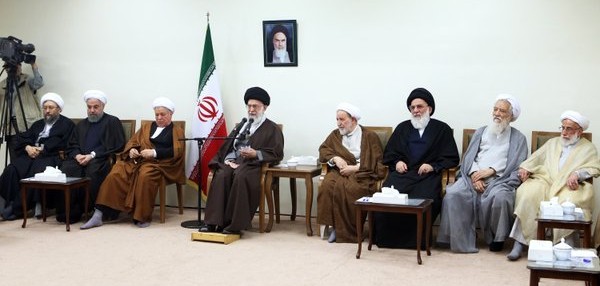PHOTO: Supreme Leader greets Assembly of Experts members on Thursday
LATEST
In his first major statement since February 26’s elections, Iran’s Supreme Leader has criticized President Rouhani and expressed concern over the outcome of the vote for the Assembly of Experts.
Ayatollah Khamenei addressed the Assembly, which names and can nominally replace the Supreme Leader, on Thursday. He called for an end to questions about the Guardian Council — appointed by him and the judiciary — which disqualified thousands of candidates in an attempt to limit centrists, linked to President Rouhani and former President Hashemi Rafsanjani, and reformists in the elections for Parliament and the Assembly:
It is possible that [disqualified candidates] are upset, naturally, but they must not destroy the Guardian Council. They should pursue their complaints through legal channels instead… Reviewing 12,000 people in 20 days is a legal difficulty that must be resolved. The Guardian Council should not come under attack due to this legal difficulty.
Rouhani has called for an end to the Council’s power to vet candidates, but the Supreme Leader has rebuffed the President.
However, the mass disqualifications — including all but 90 reformists, dozens of MPs, and the grandson of the founder of the Islamic Republic, Ayatollah Khomeini — backfired when centrists and remaining reformists formed the List of Hope to contest the elections. The alliance won a significant minority of Parliamentary seats, including all 30 in Tehran, and conservatives are still searching for a majority after more than a decade’s dominance in Parliament.
Even in the Assembly of Experts, where the Council had left only one conservative candidate to run unopposed in some contests, the centrist-reformist group had success. In Tehran, it supported 15 of the 16 victorious candidates, as the chairman of the Assembly, Ayatollah Mohammad Yazdi, lost his seat.

President Rouhani and ex-President Hashemi Rafsanjani (2nd and 3rd from left) listen to Supreme Leader’s address
Khamenei: Election Was An “Injury” to Assembly
Khamenei accepted the outcome of the election, emphasizing the honor of conservatives in defeat and denouncing centrists and reformists who challenged the disputed 2009 Presidential election:
Unlike those who were not elected in 2009 and who launched a costly sedition that attracted the enemy, those who were not elected in these elections congratulated the winners. This is very valuable and honorable.
In a pointed intervention, he said the defeats of Ayatollah Mohammad Yazdi and the leader of the hardline Endurance Front, Ayatollah Mesbah Yazdi, were an “injury” to the Assembly.
The setbacks for the conservatives have given a boost to former President Rafsanjani, who is hoping to regain the chair of the Assembly that he held from 2007 to 2011.
Hardliners and conservatives fear a Rafsanjani proposal to replace the Supreme Leadership with a fixed-term Council after Ayatollah Khamenei’s death. The issue has taken on urgency because of the possibility that Khamenei, 76 and in fragile health, may not survive the eight-year term of the Assembly.
The Supreme Leader implicitly pushed back Rafsanjani on Thursday, calling on the Assembly to “remain revolutionary, think revolutionarily, and act revolutionarily” if it has to choose a successor.
A Warning to Rouhani over Foreign Affairs and Economy
The Supreme Leader also warned Rouhani on foreign policy and economic matters.
Khamenei chided the President over the approach of engagement with “some officials’ statements that we must interact with the entire world”:
We must have relations with the entire world, of course, with the exception of the U.S. and the Zionist regime [Israel]….We have been injured by the West, and we must not forget what the West has done to us. I do not favor severing relations with the West, but we must understand who we are interacting with.
Khamenei also criticized the Government’s pursuit of trade and investment deals with Western countries following the removal of US and European Union sanctions over Iran’s nuclear program:
We have seen Westerners coming and going, but these comings and goings have not had any positive effects yet. It should be clear in practice what effect these comings and goings will have. Otherwise, they are only agreements on paper that have no value.
We’re damaged by west & shouldn’t forget what west did to us. I don’t favor cutting ties with west, but we must know who we’re dealing with.
— Khamenei.ir (@khamenei_ir) March 10, 2016
(hat tip to Iran Tracker for translations)
Russian Official: We Will Send S-300 Missiles to Iran
A Russian arms export official has said, yet again, that Moscow will send S-300 anti-aircraft missile systems to Iran.
Sergey Chemezov, the CEO of the State corporation Rostec, told the Wall Street Journal, “I think we will deliver the S-300 by the end of the year. The first delivery will be in September or August.”
Chemezov has repeatedly said that shipment of the S-300s is imminent, and Iranian officials, including Defense Minister Hossein Dehghan, said the missiles will arrive by Iran’s New Year on March 21. However, there is no sign from the Russian Government that the deliveries are arranged.
Russia and Iran signed the contract for the S-300s, but it was suspended in 2010 amid international sanctions over arms shipments to Tehran. President Vladimir Putin lifted the suspension in a decree last April.

